My Father, My Tormentor


I look like my father, move like my father, talk like my father. When I was a child and we went places together, we were a full-size and miniature version of the same windup toy, our strides clipped and jolting, brows clenched in concentration, pale legs eerily glowing in the brilliant Miami sunlight. I am unmistakably my father’s daughter, but we’re estranged from each other. The last time I saw him, more than a decade ago at my grandfather’s funeral, he gave me a kiss. I don’t expect he’ll kiss me again.
Thirteen hundred miles from me, still down in South Florida, my father is going about his day, and I can imagine it. He wakes before dawn, weighs himself, goes for a walk or a jog or rides his stationary bike. He eats breakfast if the scale permits and then he puts on a suit and drives to his law office. If he’s angry about something—and he usually is—upon arriving at work, he’ll pick up the phone and call around until he finds someone with the power to rectify the problem. Let’s hope they fix it right away. Otherwise, maybe tomorrow morning, but probably this afternoon and quite possibly this very hour, he will ring them up again and start shouting. Eventually they will do whatever my father wants, just to be free of him.
I sympathize. I have loved my father and I have feared him, and I have lain awake in the dark late at night worrying what it means to have half his genome inside me, but I have never understood him. Sometimes I have felt that if I could just reach down far enough into myself, I would find the answers: what he wants, what he fears, what he loves. The older I get, the more I search backward, as though if I could know everyone who led to my father, who made him who he is, I would know him, too.
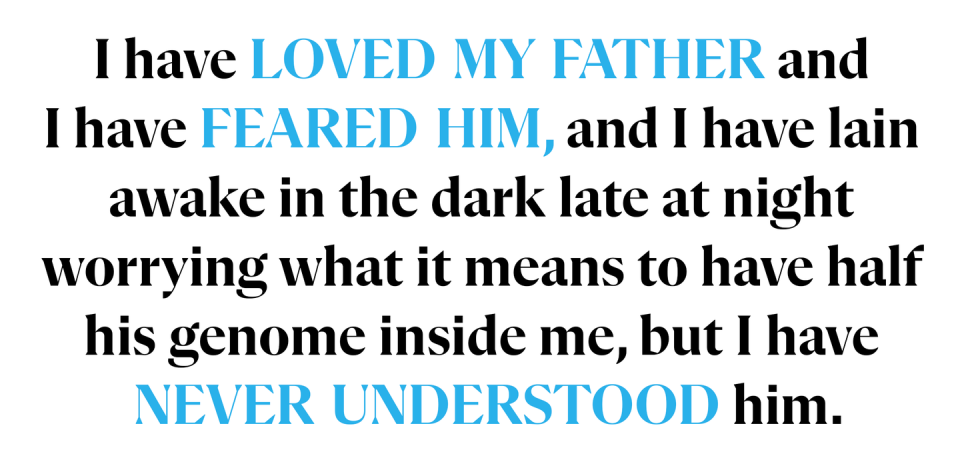
He believed in loyalty to blood, by which he meant our Mississippi Delta ancestors. He was the only person I knew, growing up in Miami, who defended slavery. More than a hundred years after the Civil War, my father actively mourned its abolition and raged over integration. Being an educated man, with a Masters from a northeastern Ivy League university he’d attended on scholarship, he was careful not to share his opinions with just anyone. But at home, he recounted the glories of the Old South, cut Black children out of my storybooks, or painted over their faces. White people were superior, he said. And I, as a result of being his child, was more superior still.
I came into being through a kind of homegrown eugenics project. My parents married not for love but because they believed they would have smart children together. This was my father’s idea, and over their brief courtship he persuaded my mom of its merits. Not uncoincidentally, nearly every early memory I have of my father involves letting him down in some way. He spanked me if I failed to finish everything on my plate in the half hour he allotted for each meal; he spanked me for being constipated; he spanked me for watching Sesame Street, because Black and white children played together on it. He didn’t spank me if I made less than an A on a math test, but berated me for weeks afterward and made long-division quizzes to occupy my weekends.
My dread of his wrath was a dull, continuous ache, a mental, physical, and emotional rheumatism that felt endemic to me. My mom tells me she came upon him, when I was eighteen months old, leaving a box in the middle of my room and telling me not to touch it, that I’d get a spanking if I did. She watched as he watched through a crack in the door until I did stick out my finger and make contact, whereupon he rushed in to deliver the discipline he’d promised. So I suppose the fear truly was formative.
My mom is a blond-haired, amber-eyed whirlwind of charisma, creativity, and passion, the best storyteller I know. She agreed with reluctance to date my father and then, convinced by the picture he painted, married him with pragmatic resolve six months later. They would have smart children; she would stay home and keep house; he would be a stable husband, parent, and provider, a corrective to her own fatherless childhood. My father didn’t know that she’d only recently kept more than thirty cats in her small two-bedroom house and been featured in the newspaper as president of the Dallas cat club. Membership had really taken off during her term, which isn’t surprising; she’s always been a gifted evangelist. By the time my father started courting her, she’d found homes for all but three cats. She’d also been divorced and followed up her first marriage with a soul-crushing affair. Less than a decade later, my mom started a church in our living room, ministering to downtrodden people rather than stray animals. When we went to the grocery store, she wore a blue pin with white lettering that read, i got it!, “it” being Jesus, as she gladly told anyone who asked and many who didn’t. She had not been raised religious, but when her conversion came, it was swift and feverish.

My parents’ marriage somehow lasted twelve years. My sister’s birth six years in didn’t halt their arguments, which overflowed into lakes of Corningware and casseroles and condiments and juices that my mom threw from the stove and fridge across the floor before roaring away in the car. Toward the end of their time together, my father would wake her in the night with a flashlight lit under his face. “And furthermore,” he would say, continuing an argument they’d been having hours earlier.
In my younger years, I viewed storytelling as an inherently positive part of myself, something to be proud of that came from my mom. Yes, my mom told stories, but so did my father. One in particular he told again and again, a fable intended to bolster his maxim that Black and white children should never mix.
As a boy my father often played with Mann, the son of his grandmother’s onetime housekeeper. One day, my father was counting his quarters in front of Mann. When Mann left, my father discovered he was missing a quarter. He counted several times to make certain but still came up short. Soon Mann came whistling up the street with a six-pack of Coke.
At that time, a six-pack cost—here my father paused for dramatic emphasis, to give his young listeners a hint that this was a time for deductive reasoning—exactly a quarter. My father asked Mann where he’d gotten the six-pack, and Mann said he’d bought it. My father asked where he got the money. Mann said he’d saved it up. Because of the missing quarter, my father knew Mann was lying. The adults agreed. Mann was punished, and my father never played with him again. Thus, my father said, no Black child could be trusted, ever. This was the lesson my sister and I were to take from his experience.
Even as a child, I realized Mann was a strawman (though I didn’t know the word). The fact that this one child had supposedly stolen a quarter from my father didn’t mean that every Black kid stole quarters. Also, having played Monopoly with my father, I could easily imagine him counting his change and lording it over his grandmother’s servant’s son. My sympathies lay with Mann, who in my father’s story had the temerity to take action against him.
My father easily filled the role of “racist parent” when I was a child. But my mom sat by as my father told my sister and me that story. In his presence, she neither endorsed nor rebutted it. When he wasn’t around, she despaired over and mocked his racism.
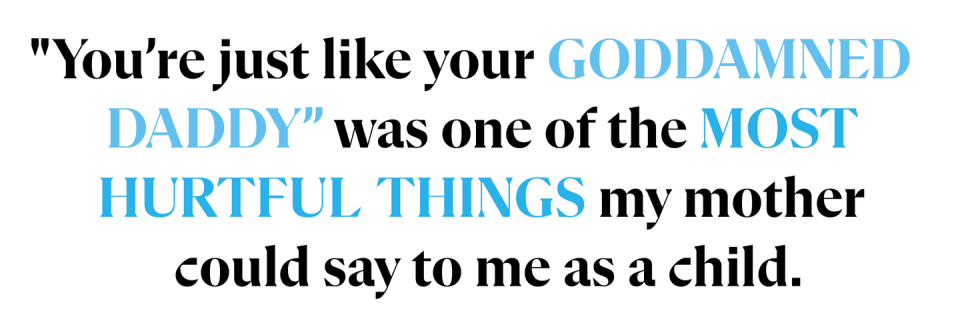
But a few years ago, I mentioned the story of Mann and the quarter, and my mom told me it wasn’t true. My father made it up. He told her when they were dating that he’d gotten Mann in trouble for stealing a quarter that had never even gone missing. He thought it was funny. He also thought it was courtship material, apparently. Judging by the fact that my mom married him, it seems he was right. By email, I reminded my mom that my father used the Mann story to persuade my sister and me that Black children were inherently untrustworthy, to persuade us of the necessity of segregation. I asked her: “Since he’d already told you it wasn’t true, what did you think when he told it to us? Did you ever ask him to stop lying about it? Or did you consider telling us? What did you think when he told us that we couldn’t watch Sesame Street? Or when he cut Black children out of our storybooks? What did Granny think?”
My mom didn’t reply to the question about the Mann story but said, “I was absolutely disgusted at his cutting pictures out of your books. He didn’t care what I thought. I guess I figured in your little hearts that you would know his actions amounted to nothing in your life attitudes…. Maybe I was wrong, but I never felt as if either of you really respected him or wanted to be like him or his prejudices.” I followed up with more questions, but she didn’t answer them.
The adults in the 1950s Delta believed my father’s story about Mann. Or at least they pretended to believe him. But the truth was the opposite of the moral my father sought to impart. The white boy was the perpetrator, the unsafe and dishonest figure. The Black boy was punished for buying himself a six-pack of Coke and walking happily down the street with it.
As I pondered my mother’s complicity in my father’s deceit, I also mulled my own. When I was in high school, my father introduced my sister and me to two different girlfriends. “My friend,” he called each of them, in their absence. He instructed us not to mention them to each other.
Over the years, we saw them regularly and did as he said. My grandparents visited, met the girlfriends, and followed suit. Friends of mine saw him out with different women, at the movies, at dinner. When I was thirty, he introduced me to another girlfriend, who I later learned was a little younger than I was. It became clear that, from my father’s perspective, one of my primary roles on visiting was to help him juggle all the relationships by perpetuating his lies.
His longest-term girlfriend, Jenny, was under the impression that our father spoke with and visited my sister and me constantly. “When she asks you about my visit to New York,” he coached me once, as we were heading to her place, “just go along with it.” Another time, he instructed me to pretend Max and I were staying with him even though we were at Max’s grandmother’s apartment. He later explained that the girlfriends believed my sister still lived in Miami and was getting a graduate degree in accounting at a university there. (In reality, my sister had moved away in her early twenties, didn’t speak to him, and would never have studied that.)
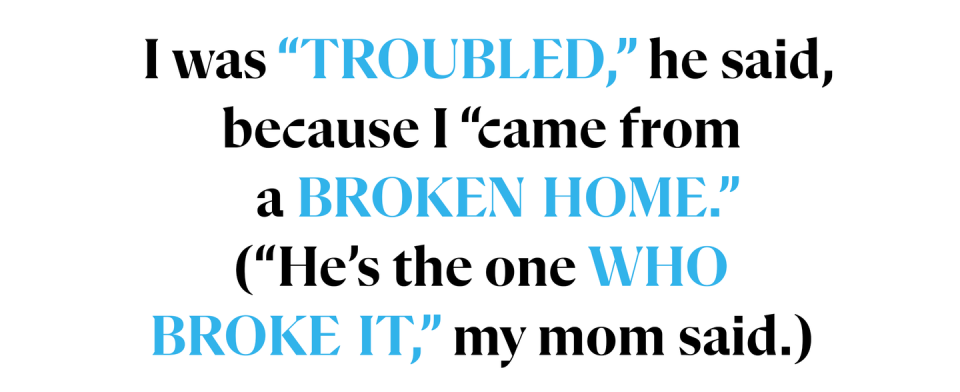
Max and I last visited my father in 2001, for Christmas. In a phone call beforehand, my father ran down the particular untruths we were to tell each woman. When I called Max to fill him in, he surprised me by saying he wouldn’t lie to enable my father’s womanizing. I was thirty years old, a feminist and women’s-studies minor, and the idea of refusing to help my father string women along had never occurred to me. After a shocked silence, I agreed and rang my father to tell him.
At first, my father shouted and lectured. “I take umbrage at your use of the term ‘womanize,’” he said. I encouraged him to look up the definition. He insisted that Jenny was “too fragile” to handle the truth. I laughed and hung up. In the end, he grew conciliatory, assuring me that no questions would arise, no lies would be necessary. Weeks later, Max, my father, Jenny, and I set out on a ninety-minute drive to Christmas Eve dinner at Jenny’s sister’s house. Five minutes in, Jenny began to cry. She said it would be our last Christmas together, because my father wouldn’t marry her. Then she asked why my sister couldn’t be with us.
I’d told my father I wouldn’t lie for him, but apparently I was not immediately going to come forward with the truth. I heard myself telling Jenny that I wouldn’t answer questions about my sister. “You’ll have to ask my father,” I said, bowing to his dictates even as I claimed to reject them. In the moment it felt like the greatest defiance imaginable.
Jenny asked if I’d been on the phone with my father one night when an operator interrupted a call at her request. She knew my father and I spoke all the time, she said. (In reality, we spoke once a week, on average, for about twenty minutes, when we were both at work.) But what about then? “Sorry,” I said. “I don’t know what you’re talking about. I don’t know about that.”
Jenny turned to my father, her face blotchy with anguish. “You lied!”
“If you don’t shut up, Jenny,” he said, slamming his hands on the wheel, “I’m going to turn this car around.”
It was a flashback to my childhood. “Sorry,” I whispered to Max in the back seat, and he took my hand. We careened along the interstate. Jenny wept and asked my father where my sister lived. He told her to be quiet. Finally, as we turned in to Jenny’s sister’s driveway, my father offered an answer that technically didn’t contain a lie. “Well, if you go to FIU, you must live in Miami,” he said (implying my sister lived in Miami without explicitly saying she did).
His manipulation enraged me. “That’s it,” I said. “We’re not staying.”
Jenny’s family rushed out to greet us. I’d never met her mother or sisters before. “Merry Christmas!” they shouted. Jenny sobbed into her sister’s sweater. “They just got here,” she said, “and now they’re leaving!” The family supported her to the door in her crying and went inside. Max tried to arrange alternate transportation, but taxis were scarce, ride-hailing apps did not exist, and Max’s brother, who lived an hour’s drive away, was, very reasonably, enjoying Christmas Eve dinner of his own. So we knocked on the door, after all, as the others assembled at the table. We were led to the sofa, given plates, and encouraged to help ourselves from the platters in the kitchen.
On the drive home afterward, Jenny asked about my sister again. “She’s not here because she’s in Massachusetts,” I said. “Where she lives.”
Jenny turned around to look at me. “She doesn’t live with your mother anymore?”
No point in holding back at that stage. “My mom moved to North Carolina six years ago.”
A long silence passed. I squeezed Max’s hand. My father’s watch ticked. “Why would you lie to me about that?” Jenny asked him.
“I don’t know, Jenny,” my father said. “I just don’t know.”
A few minutes later, Jenny changed the subject. Wasn’t the baby at dinner cute? Didn’t my father love him?
Several months later, I had a work voicemail from Jenny. She was weeping. She wanted to apologize, she said, if she’d done something wrong at Christmas.
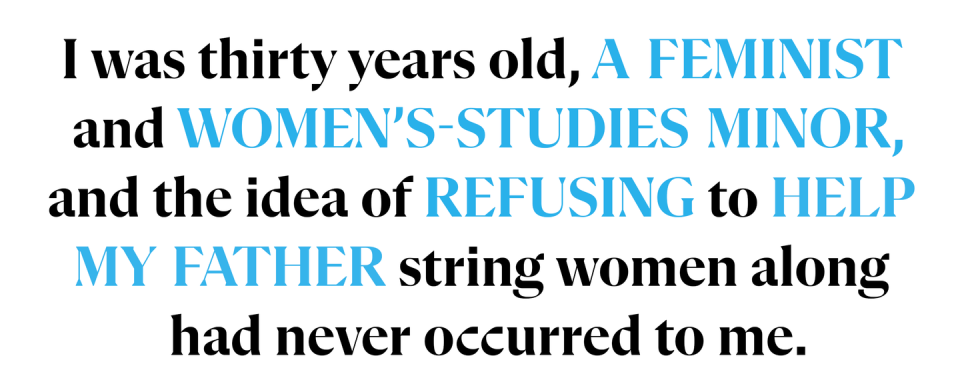
Back in New York, I didn’t see a way to have a relationship with my father without getting entangled in his toxicity. I sent a letter cutting off contact. I said I would be willing to communicate about the past, present, and future of our relationship but only by letter. He left voicemail for me at work. We were “both professionals,” my father said, and “as professionals, we should settle this like professionals.” When I didn’t succumb, he told his parents I’d made up the Christmas Eve story. I was “troubled,” he said, because I “came from a broken home.” (“He’s the one who broke it,” my mom said, her voice vibrating with colossal sass and annoyance, when I told her this.) My grandparents believed him.
So many nights I sat in my father’s study, flooded with dread. When I was nine years old, his disapproval focused on my math grades, but I knew one day he’d discover that sharing his genes didn’t make me a genius. Eventually, I’d be unmasked as an ordinary person of reasonable intelligence. He would see that I was, by his metrics, fundamentally defective.
And he did. I was careless and lazy, he said. I needed to put my nose to the grindstone. In high school, there was no excuse for my trouble with physics. When I was kicked by a horse and limped for a time, my father was embarrassed to be seen with me. Later, when I was in college, I needed to lose weight. I styled myself poorly. I should wear high heels on campus, grow my hair out, and wear more dresses. After my overactive thyroid made my hands shake and eyes bulge, he berated my mom for her “defective genes.”
But my dad married my mom in part to compensate for deficits of his own. People found her charming. He must have hoped they would view him more favorably by extension and that his children would inherit her charisma. I hoped so, too. “You’re just like your goddamned daddy” was one of the most hurtful things my mother could say to me as a child; later I learned it was something her mother said to her.
My father seemed to strive to be unpleasant. In restaurants, if he thought the meal was taking too long, he’d clomp to the kitchen, bang on the door, demand an update. My sister and I would stare at the table when the server brought our plates. His tips were abysmal. Sometimes he left a quarter. If my mom put extra money on the table, he pocketed it. He shouted at grocery-store cashiers, parking-lot attendants, school guidance counselors—anyone who disappointed or inconvenienced him, which nearly everyone did. When meeting people he believed to be his social inferiors, he reveled in giving them his “dead fish” handshake. But on occasion during my childhood, I saw him alienate people by accident. I wondered if he could tell they didn’t like him and if it hurt his feelings. I felt embarrassed for him, watching him “uhhhh” through conversations, gesticulate as stiffly as I did, speak with the same strange deliberation, but with no apparent intuition as to other people’s reactions. Looking back, I can see he was nervous that I might take after him socially. I was a strange, anxious child, but I always had friends, and he was relieved by this.
His lack of common sense, especially in anger, was remarkable. My mom likes to tell the story of the time, when a toilet wouldn’t stop running, he hit the tank with a hammer and shattered it. (Ever thrifty, he apparently put it back together with aquarium glue.) He made coffee by boiling the grounds in a saucepot and pouring liquid from the resulting sludge. After the divorce, when my sister and I were at his house, he’d put us to bed and then sneak out. We didn’t mind being left alone. We snooped through his things, found lingerie and a letter from a girlfriend. We ate ice cream. But after a break-in one night when we weren’t there, he put key-operated dead bolts on our bedroom doors. Then he locked us in from the hallway, leaving no escape but the windows. “Good night, y’all!” he’d say, as he extracted the key. “Daddy loves you!” Soon his car would be pulling out of the garage, into the night.
His house during those years was perpetually infested with huge flying water bugs. They lived in the bathrooms, the pantry, the toaster oven. Many mornings, he’d start making cheese toast for my sister and me and, as the heat clicked on, we’d hear the roaches scrabbling. He’d remove the bread and cheese, douse the toaster oven with Raid, wait a minute or so, and put the toast back in to cook. Sometimes bugs staggered out. Other times they crackled and twitched as cheese dripped down. The toast tasted like burnt cheddar, dirty pennies, and cheap drugstore sunscreen that gets in your mouth when you sweat. Even as a teenager, I was too afraid of his anger to protest.
Until I cut off contact with my father, I downplayed my writing in a way that still bleeds into how I live my life now, a bifurcated existence, one foot in the work I love and the other in a job I’m good at, which affords me a paycheck and benefits. Much of my impulse to write comes from my mom. She endlessly read me books as a child and was always highlighting books of her own. Later, she brought me stacks of library books, sometimes seven one day and seven more the next, and helped with my papers. For many years, she wrote, too—sermons that got longer and funnier and more passionate when she was in the pulpit. But her love was for the performance of storytelling, not the writing. My obsessive commitment to putting words on the page, the way I construct pieces of writing, is much more influenced by my father. Throughout my childhood, he jotted notes in legal pads, read heavy law books, wrote and published articles. When I was seven or maybe eight, he decided to write a legal treatise, the first in its subject area. He was the parent I saw, night and day, sitting at his desk, writing paragraphs, crossing them out and writing new ones. It was his job. After it was published, he updated his book every year, page proofs littering the floor around the desk in his study.
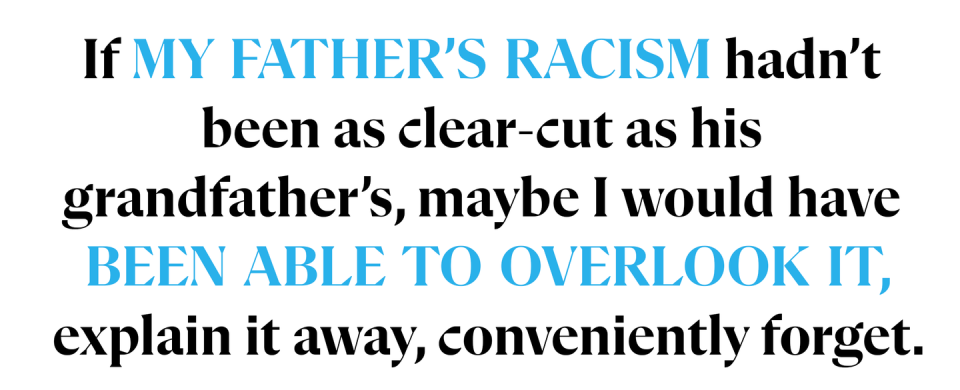
In many ways, my father’s writing is the opposite of what I like to read and try to write. I lean toward straightforward language, active verbs, whereas he uses passive voice and legalese even in personal correspondence and casual conversation. In 2004, after he and I had been estranged for three years, he sent my sister and me photocopies of a letter addressed to us, making the case that our mother was to blame for their divorce, as if that would persuade us to get in touch.
Most regrettably we have had little contact during the past year and I must acknowledge my bewilderment in this regard.
In this connection my thoughts reverted back to the [attached] 1/20/84 letter from Mommy to me setting out the reasons from her perspective for the divorce. As this was indeed only 9 months after the divorce it is perceived same would offer the most accurate and true state of mind concerning the divorce and the events leading up to it.
If he felt anguish at our absence from his life, he didn’t specifically express it. He did sign off with love.
I remember telling my parents at four or five years old that I planned to be a writer. My father seemed to take me seriously, which made me feel that being a writer was possible. Recently, I discovered that when I was in high school he sent my maternal grandmother a copy of a short story I’d written, including a note that he wanted her to see it. Over the years, he came to view my creative pursuits as a boondoggle, possibly unsavory. And I imagine if he had it to do over again, he would have tried to eradicate those ambitions at the first sign of them, just as he hammered the head off my sister’s brown-skinned toy, just as he forbade me to play guitar and my sister to play with a football. But it was too late. He encouraged my writing before he discouraged it. His certainty that I could achieve whatever I set out to do was a powerful force. I’m grateful to him for that.
Nowadays I trace fundamental aspects of the way I write to my father’s side of the family—the way I return to subjects again and again, from different angles, explaining my thoughts and feelings to myself as I go and then building them into an argument to satisfy myself and anyone else who might, along the way, be persuaded. I suppose it’s a less intrusive counterpart to my father’s urge to appear at the foot of someone’s bed in the middle of the night with a lit flashlight under his face to say, “...and furthermore.” My insistence on understanding my family’s enslaving history is also a legacy of my Newtons. If my father’s racism hadn’t been as clear-cut as his grandfather’s, maybe I would have been able to overlook it, explain it away, conveniently forget. I’m not glad he raised me in such an explicitly white supremacist way, but I’m grateful that he made it impossible for me to move through life without the level of ignorance I might have had otherwise. He highlighted a trauma our people wrought, in a way I couldn’t forget or ignore.
And so, in a roundabout way, it was my father who led me to reckon with our ancestors, to research their lives and to come forward publicly and say, I originated with this and I feel a responsibility to think about that, how I can be an ally to people who are descendants of people that my ancestors enslaved or oppressed or cheated, how I can work against these underpinnings of our society that are still very much with us. The process of wrestling with and reconciling myself with my ancestors will never end. But when I accept the ongoing nature of this work and open myself to what it can teach me, it feels like an enlargement into possibility rather than a clenching against the past. It feels like love, and it feels like freedom. It feels like acknowledging the best and the worst of the people whose bodies created my body, and choosing to carry the best forward with me.
Copyright © 2022 by Maud Newton.
You Might Also Like

